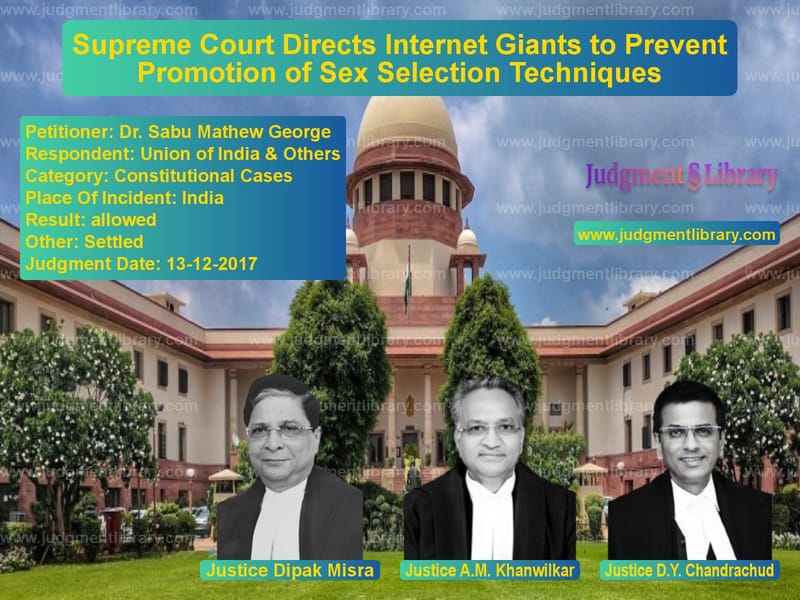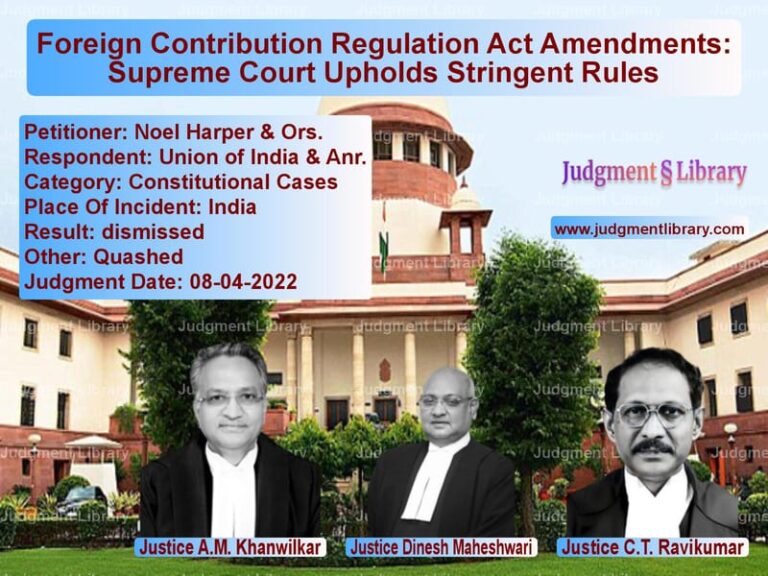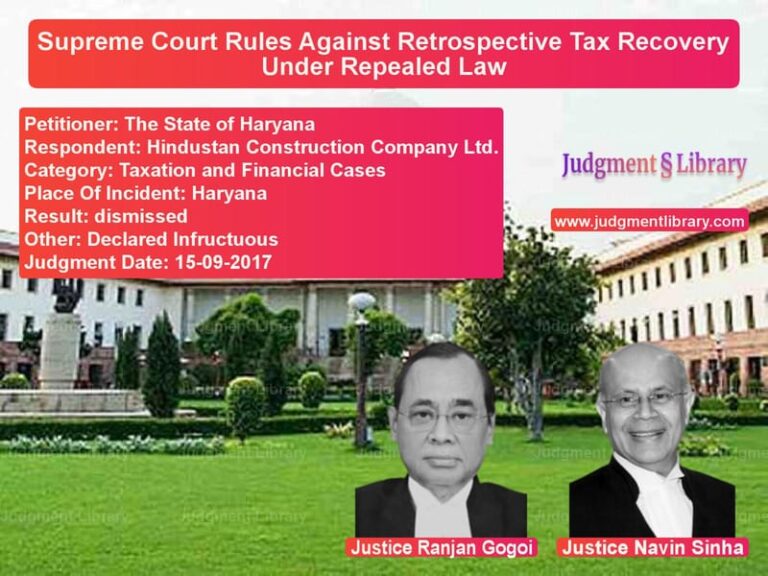Supreme Court Directs Internet Giants to Prevent Promotion of Sex Selection Techniques
The Supreme Court of India, in the case of Dr. Sabu Mathew George vs. Union of India & Others, delivered a landmark judgment ensuring strict enforcement of the Pre-Conception and Pre-Natal Diagnostic Techniques (Prohibition of Sex Selection) Act, 1994 (PCPNDT Act). The case was filed by Dr. Sabu Mathew George, a public-spirited individual, seeking to curb the online promotion of sex selection techniques by search engines such as Google India, Yahoo! India, and Microsoft Corporation (India).
The judgment holds global internet companies accountable for their role in preventing access to advertisements and information that promote sex determination, which is strictly prohibited in India. This ruling is significant in the fight against female foeticide and declining sex ratios in the country.
Background of the Case
The petition was filed to direct search engines and government authorities to block online advertisements, messages, and any content that promotes sex selection. The petitioner sought:
- Blocking of search results that provide access to sex determination services.
- Strict enforcement of Section 22 of the PCPNDT Act, which prohibits the advertisement of sex selection techniques.
- Setting up a monitoring mechanism to identify and remove violative content.
- Increased public awareness regarding the prohibition of sex selection.
Petitioner’s (Dr. Sabu Mathew George) Arguments
The petitioner argued that:
- Online search engines were enabling access to illegal services that facilitated sex determination.
- The PCPNDT Act prohibits all forms of advertisements related to sex selection.
- Search engines must implement an “auto-block” mechanism to prevent such results from appearing.
- India’s alarming decline in female child births necessitates strict enforcement of the law.
Respondents’ (Google, Yahoo!, Microsoft, and Government of India) Arguments
The respondents presented their defenses:
- Google India, Yahoo! India, and Microsoft Corporation claimed they were intermediaries and could not regulate content beyond their automated policies.
- The Government of India stated that it had taken steps to set up a Nodal Agency to monitor violations.
- The search engines agreed to cooperate but argued that they needed clear guidelines on implementation.
Supreme Court’s Observations
The Supreme Court, in a judgment delivered by Chief Justice Dipak Misra, Justice A.M. Khanwilkar, and Justice D.Y. Chandrachud, made the following key observations:
“The respondents have a role to control [the dissemination of such information] and must ensure that the mandate of the PCPNDT Act is scrupulously followed.”
The Court further emphasized:
- Section 22 of the PCPNDT Act clearly prohibits advertisements and any content that aids sex determination.
- Search engines have the capability to block access to prohibited information and must take proactive measures.
- The Government must establish a strong monitoring mechanism to identify and report violations.
- Search engines must implement an “auto-block” feature for keywords associated with sex selection.
Final Judgment and Directives
The Supreme Court issued the following directives:
- The Government of India must constitute a Nodal Agency to receive complaints about online content promoting sex determination.
- Search engines must automatically block prohibited content and ensure compliance within a stipulated time.
- The Nodal Agency must actively monitor advertisements, messages, and search results violating the law.
- Public awareness campaigns must be conducted through television, radio, and print media to highlight the illegality of sex selection.
- Search engines must prominently display warning messages when users attempt to search for related content.
- Any violations brought to the notice of search engines must be removed within 36 hours.
Impact of the Judgment
This ruling has far-reaching implications for internet regulation, gender justice, and law enforcement:
- Strengthens laws against sex selection: Ensures that online platforms cannot be used to promote illegal activities.
- Holds search engines accountable: Sets a precedent for online platforms to comply with national laws.
- Raises public awareness: Promotes a stronger societal stance against gender discrimination.
- Encourages strict monitoring: Establishes government oversight to prevent violations.
The Supreme Court’s decision reinforces India’s commitment to eliminating gender-based discrimination and ensures that technology is not misused to undermine legal safeguards.
Don’t miss out on the full details! Download the complete judgment in PDF format below and gain valuable insights instantly!
Download Judgment: Dr. Sabu Mathew Geor vs Union of India & Oth Supreme Court of India Judgment Dated 13-12-2017.pdf
Direct Downlaod Judgment: Direct downlaod this Judgment
See all petitions in Fundamental Rights
See all petitions in Public Interest Litigation
See all petitions in Legislative Powers
See all petitions in Judgment by Dipak Misra
See all petitions in Judgment by A M Khanwilkar
See all petitions in Judgment by Dhananjaya Y Chandrachud
See all petitions in allowed
See all petitions in settled
See all petitions in supreme court of India judgments December 2017
See all petitions in 2017 judgments
See all posts in Constitutional Cases Category
See all allowed petitions in Constitutional Cases Category
See all Dismissed petitions in Constitutional Cases Category
See all partially allowed petitions in Constitutional Cases Category







